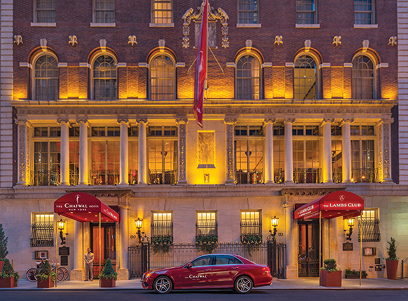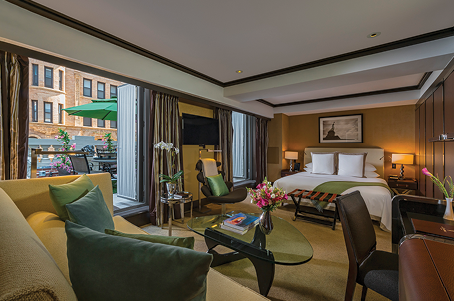- Home
- Media Kit
- Current Issue
- Past Issues
- Ad Specs-Submission
- Ad Print Settings
- Reprints (PDF)
- Photo Specifications (PDF)
- Contact Us

![]()
ONLINE

The Value of Personalization
Editors’ Note
Ashish Verma was previously with the Lowell Hotel in New York, where he served for seven years as General Manager. Prior to the Lowell, he served as General Manager at the famed Windsor Court Hotel in New Orleans and has held senior positions with luxury hotel companies including Orient Express Hotels, Millennium Hotels, Hyatt International Corporation and Oberoi Hotels International. He earned a Bachelor of Arts degree with honors in political science and economics from Punjab University in Chandigarh, India; a graduate degree in Hospitality Administration from the Oberoi School of Hotel Management in New Delhi, India; and a Master of Business Administration from IMHI Cornell-ESSEC in Paris, France.
Property Brief
Located in the heart of Manhattan on 44th Street, The Chatwal New York (thechatwalny.com) is the most centrally located luxury boutique hotel. A landmark building by architect Stanford White, and designed by the famous Thierry Despont, this 76 guest rooms and suites (many with terraces) iconic jewel boasts numerous custom amenities, such as Georg Jensen designware, Christofle silverware, Bernardaud porcelain, Assouline books and Asprey amenities. All rooms are state of the art, with TOTO washlets, Intelity iPads, and custom Alpaca throws. The hotel offers Mercedes house car and butler services for all guests.
Many hoteliers have expressed it being a challenging time for growth with new supply and other factors occurring in the New York City market. Where do you see the business today?
If a property has a niche and if its product and services have something unique about them, the more desired it will be and the more it will be viewed as a leader in its market.
There is much more supply in New York, and there is a bit of flattening in demand, especially from international markets. Airbnb is a factor, and not just for the lower and mid-tier, but somewhat for luxury too. However, if we focus on our niche and offer a differentiated product, then we can create a unique experience. I won’t say there is abundant growth, but there is carefully designed growth for a special hotel.

Entrance of The Chatwal New York
Is your competitive set more geographic based on location or do you focus on properties throughout the city?
Geographically, we have no other luxury boutique hotel in the vicinity. We’re fortunate in being in the heart of Manhattan, within the most convenient walkable distance to the best of shopping, dining, theater, parks and museums. Our compset is a mix of hotels.
There is always a push and pull between rate and occupancy. Is the focus more on driving occupancy or driving rate in the luxury segment?
With us, it’s definitely the rate. Raising occupancy is easier, but we can dilute the brand that way, and it doesn’t help the profitability. I believe the only way to increase sustainable profitability is through ADR.
Fortunately, since I joined The Chatwal, we’ve seen some steady growth in this area. We are focused on the unique elements of the accommodations – the terraces, specialty suites and many experiences where we can create value through packages and by partnering with Broadway promotions. We have highlighted the uniqueness of The Chatwal in the heart of Manhattan and will continue building higher rates.

Sanctuary Suite
How critical is it to be able to accommodate guests with such a strong suite offering?
The affluent guest traveling with family will expect luxury accommodations like our specialty suites with terraces. We also don’t want to offer predictable accommodations. We want a charming, creative and thoughtful product, and we offer that with our distinct suites.
Our suites are in high demand because of their design, space and the views, from the many city exposure suites to the more discreet ones. They provide the opportunity to step out and dine al fresco, which justifies our expectation on the rate side, and the fact that we have 29 suites helps the ADR as well.
We have worked hard to make our suites the crown jewels of The Chatwal.
What are the keys to being successful with food and beverage?
We’re fortunate that our visionary Chairman and Founder, Mr. Chatwal, has a lot of experience in food and beverage. He has owned hundreds of freestanding restaurants, and his focus has always been to make sure that F&B in hotels is profitable.
Often, F&B in hotels is subsidized in a way because it was more of an ancillary amenity to the rooms product. This meant F&B wouldn’t make money unless there were big banquet spaces.
When Mr. Chatwal entered the hotel business, he overturned that mindset and, through his leadership, vision and reputation, he builds solid partnerships with food and beverage entities. It has become a success model for the company and an example for the industry. He made sure that our food and beverages makes a profit. Specifically, lounge offerings are particularly profitable due to high beverage revenues.
As someone who is very focused on the guest experience, does technology take away from or enhance that experience?
It depends on how we use it and guide the man or woman behind the machine. The latest technology is something that guests are increasingly expecting, even in luxury, and especially among the younger generations. They want their convenience and, in some way, they want to be more independent. Yet, I don’t believe we can duplicate the personalization of a human connection, but we have incorporated all the expected technology and more.
As booking lead times have become much shorter, has it made forecasting more difficult?
We make a budget, stick to it and don’t deviate from it. Indeed, leisure travelers are making plans more impulsively. Even business trips are being planned on short notice. We have removed the idea of forecasting and refer to it as pace instead. We maintain the budget with the goal of exceeding it.
Does the GM role differ based on the size of the hotel?
It does. My own education and business acumen prepares me for whatever type of operation I oversee and I always try to utilize opportunities to drive a profitable business. In smaller hotels, we need to carefully decipher the key elements of the guest experience. In larger hotels, personalization is relatively more difficult to attain but still can be achieved.
From guests’ perspectives, I believe it’s personalization that adds true value.
For those interested in entering the industry, should the focus be more on schooling or the service mentality?
Mentality. It’s about enjoying what it takes to make someone else’s day, which is an art. If that aptitude is there and, additionally, someone studies hospitality, then they will succeed.•